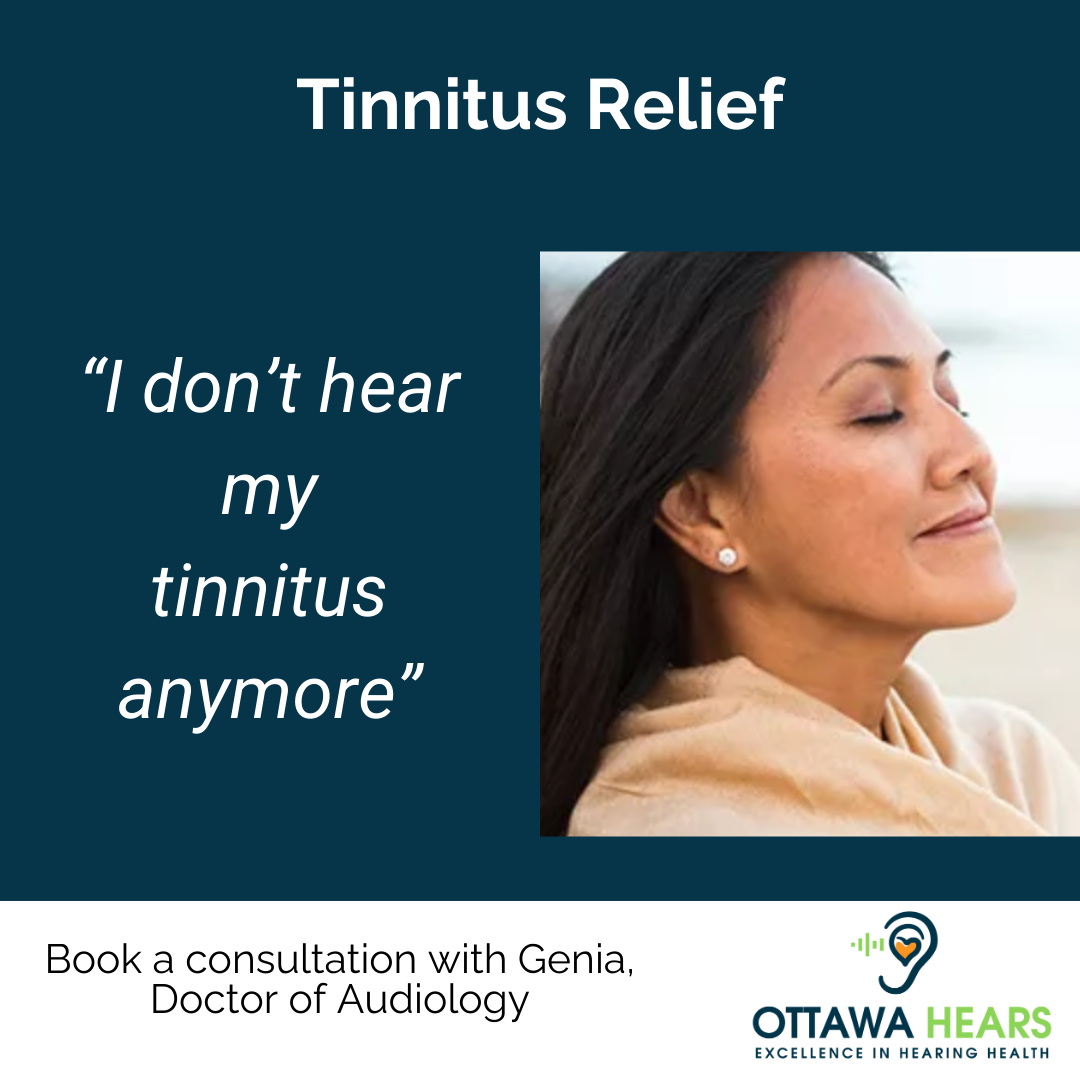Tinnitus Treatment - Ottawa Hears

Tinnitus, identified as the perception of noise or ringing in the ears, presents a significant challenge in healthcare management. Despite the absence of a universal cure, various treatments and strategies offer potential relief:
Hearing Aids: Beneficial for those experiencing concurrent hearing loss, hearing aids amplify external sounds, rendering tinnitus less noticeable (American Tinnitus Association, n.d.).
Sound Therapy: Utilizes external sounds from devices like white noise machines to mask tinnitus, aiding in distraction and lessening its impact (Mayo Clinic, 2020).
Tinnitus Retraining Therapy (TRT): This approach combines sound masking with counseling, aiming to habituate the brain to ignore tinnitus (Jastreboff & Jastreboff, 2000).
Cognitive Behavioral Therapy (CBT): A psychotherapeutic intervention, CBT assists in altering perceptions and reactions to tinnitus, thereby reducing stress (Andersson, 2002).
Medications: While no drugs specifically cure tinnitus, some, like antidepressants, may alleviate associated symptoms (Langguth et al., 2013).
Lifestyle Changes: Stress management, moderated alcohol and caffeine consumption, and improved sleep hygiene can impact tinnitus symptoms positively (Henry et al., 2014).
Ear Protection: Vital for those with noise-induced tinnitus, ear protection prevents further damage (American Academy of Otolaryngology-Head and Neck Surgery, n.d.).
Dietary Changes: Monitoring food intake can help identify exacerbating factors for some individuals (American Tinnitus Association, n.d.).
Alternative Therapies: Options like acupuncture or hypnosis may offer relief, though their efficacy is debated in medical circles (The Tinnitus Clinic, n.d.).
Mindfulness and Relaxation Techniques: Techniques such as meditation or yoga can manage stress associated with tinnitus (Gans et al., 2015).
At Ottawa Hears Audiology Clinic, patients benefit from the expertise of an audiologist certified in TRT, offering a range of management strategies. Consulting with an audiologist or otolaryngologist is essential for those experiencing tinnitus symptoms, particularly if sudden or associated with hearing loss. The clinic's personalized care and treatment plans cater to individual needs.
In conclusion, while tinnitus can be burdensome, adaptation over time is common. With appropriate guidance and strategies, its impact on daily life can be significantly reduced.
At Ottawa Hears Audiology, we provide top-quality audiological care with comprehensive hearing assessments to ensure the best hearing health outcomes for our patients.
🌐 Online: For more information or to book an appointment, please visit www.ottawahears.com. Our user-friendly online form is designed for your convenience.
📞 Phone: Prefer speaking to a person? Call us at 343-800-5909. Our friendly team is ready to assist you and answer any queries you may have.
Note: No medical referral is required to see our knowledgeable, experienced, certified, and regulated Audiologist. Additionally, many of our services are eligible for partial or full coverage by insurance or third-party payers.
References:
American Tinnitus Association. (n.d.). Tinnitus Treatments. Retrieved from [https://www.ata.org/].
Andersson, G. (2002). Psychological aspects of tinnitus and the application of cognitive-behavioral therapy. Clinical Psychology Review, 22(7), 977-990.
Gans, J. J., Cole, M. A., & Greenberg, B. (2015). Sustained benefit of mindfulness-based tinnitus stress reduction (MBTSR) in adults with chronic tinnitus. International Journal of Audiology, 54(10), 749-759.
Henry, J. A., Dennis, K. C., & Schechter, M. A. (2014). General review of tinnitus: Prevalence, mechanisms, effects, and management. Journal of Speech, Language, and Hearing Research, 48(5), 1204-1235.
Jastreboff, P. J., & Jastreboff, M. M. (2000). Tinnitus Retraining Therapy (TRT) as a method for treatment of tinnitus and hyperacusis patients. Journal of the American Academy of Audiology, 11(3), 162-177.
Langguth, B., Kreuzer, P. M., Kleinjung, T., & De Ridder, D. (2013). Tinnitus: Causes and clinical management. The Lancet Neurology, 12(9), 920-930.
Mayo Clinic. (2020). Tinnitus. Retrieved from [https://www.mayoclinic.org/].
The Tinnitus Clinic. (n.d.). Alternative Therapies for Tinnitus. Retrieved from [https://www.thetinnitusclinic.co.uk/].
American Academy of Otolaryngology-Head and Neck Surgery. (n.d.). Noise-Induced Hearing Loss. Retrieved from [https://www.entnet.org/].
keywords: Doctor of Audiology, Hearing Loss, Tinnitus, Audiology, Audiologist, Hearing Aids, FM system, Cochlear Implants, Tinnitus, Ear Health, Deafness, Hearing Test, Sensorineural Hearing Loss, Conductive Hearing Loss, Mixed Hearing Loss, Noise-Induced Hearing Loss, Ear Infections, Hearing Loss Treatment, Hearing Loss Prevention, Audiologist Consultation, Hearing Loss in Seniors, Hearing Loss in Children, Assistive Listening Devices, Otology, Ear Anatomy, Hearing Rehabilitation, Hearing Loss Symptoms, Hearing Health, Ear Protection, Custom Earplugs, Ottawa Hears Audiology, Oticon, Phonak, Unitron, Widex, Signia, Resound, Starkey